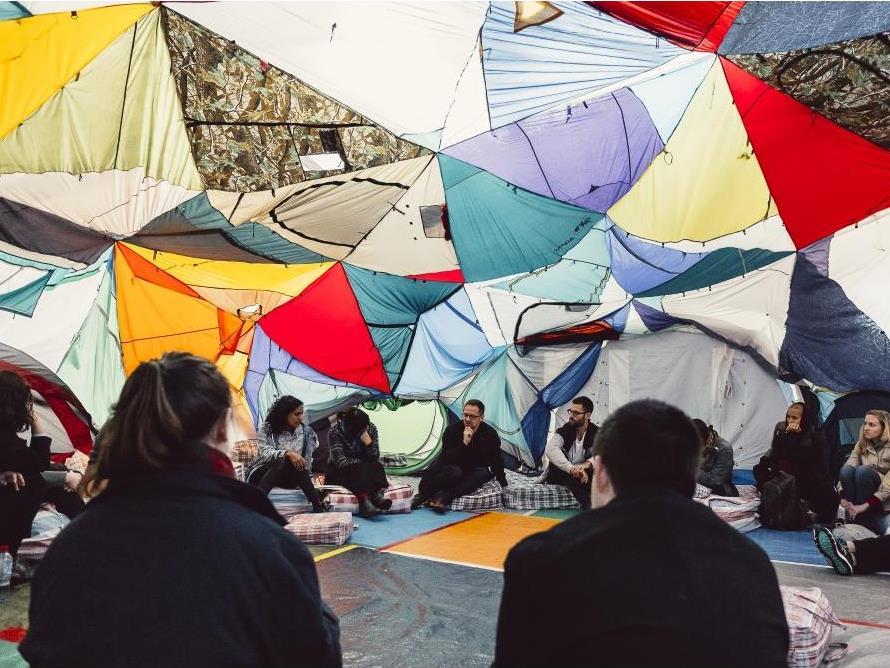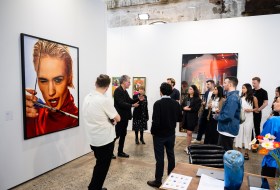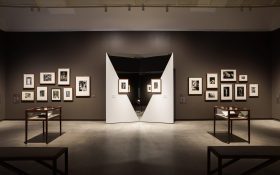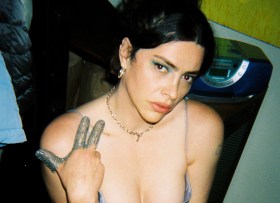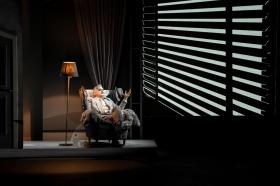Keg de Souza and Claire G Coleman’s North Melbourne School of Displacement is part of Refuge 2019: Displacement program. Redfern School of Displacement was first presented as part of the 20th Biennale of Sydney in 2016. Image: Document Photography.
Refuge 2019: Displacement is the fourth in a series of five curated programs (2016-2020) presented by Arts House which explores the intersection between art, emergency, and the impacts of climate change.
Part community meeting, part pop-up school, part expo, Refuge 2019: Displacement is an assortment of experiences and provocations that take place in, around, and immediately outside North Melbourne Town Hall. Attendees make their own choices about what to see and what to participate in, highlighting the sense of agency we all have as community members to affect change.
On the day I attended, people entered Arts House via the rear laneway, first encountering Obsolescence – a sonic installation by Bundjalung sound artist Theo McMahon, created in collaboration with Yorta Yorta musician, composer and climate justice activist Allara Briggs Pattison.
This was followed by a Welcome to Country and Smoking Ceremony from Wurundjeri Elder Uncle David Wandin, who reminded those present that Australia’s First Nations people are the land’s traditional custodians, but we are all responsible for looking after ‘Mother Country’ for the benefit of future generations. Invoking the metaphor of a passport – apt, given the program’s focus on identity, borders, and what it means to be displaced – Uncle Dave welcomed guests onto Wurundjeri land.
Moving inside, the audience then watched the mesmerising Allara Briggs Pattison perform two original compositions utilising double bass, keyboard, voice, breath and clapsticks. Briggs Pattison recorded each of these elements, live looping to create a stunning sound infused with traces of hip hop, neo-soul, and spoken word, at times inviting the audience to join her in singing certain phrases, reminiscent of spiritual and blues music.
When Briggs Pattison’s performance concluded, attendees went their own way, choosing from the multiple options on offer. My first stop was the North Melbourne School of Displacement – a series of discussions programmed by artist Keg de Souza and Wirlomin Noongar writer Claire G Coleman. Housed inside in a colourful patchwork atrium made from many tents stitched together, ‘students’ sat on cushions fashioned from reusable laundry bags, listening to Taungurung Elder Uncle Larry Walsh; author, academic and community advocate Dr Omid Tofighian (who translated Manus Island detainee Behrouz Boochani’s award-winning book No Friend but the Mountains); and Palestinian artist/activist Aseel Tayah, as they shared their lived experiences of displacement.
Related: Review: Keg de Souza: Common Knowledge and Learning Curves, Griffith University Art Museum (QLD)
Though at times distressing, it was an incredible privilege to listen to a conversation between three very different people whose lives have been so obfuscated and traumatised by colonisation. The group immediately laid bare the complexities of contemporary Australian identity and the inescapable relationship between global forces and personal pain. What was being asked of those listening was nothing less than sitting with the difficult task of deconstructing an incalculable number of assumptions that have been drilled into all of us – colonised and colonisers alike – about what constitutes ‘acceptable’ knowledge, language and morality. The discussion was colossal, ranging from questions about the validity of borders enforced through violence, to looking at the traps embedded within colonial legal and educational systems, to personal epiphanies where choices were made as a means of political disruption and personal survival.
Next up, I participated in an informal Q&A with Omid Tofighian – facilitated by LGBT+ activist Lorna Hannan – in which Tofighian introduced the feminist concept of ‘kyriarchy’ and proposed literary storytelling as a key tool for subverting dominant narratives. Attendees at this session also heard from a young asylum seeker who lives under the pervasive stress of temporary visas as he tries to build a new life in Australia.
My last stop was an installation called Portage: Flotilla in which the audience hops on one of two bamboo rafts built by artist Jen Rae, architectural designers Giant Grass, paramedics and emergency service workers, and members from local neighbourhood houses. In Flotilla, the audience experiences a 12-minute journey propelled by Marco Cher-Gibard’s intense sound score. What starts with the simplicity of a beckoning church bell builds to a maniacal cacophony of alarms, sirens and emergency announcements, hurling those of us on the rafts deep into the centre of an unspecified crisis. Reaching a crescendo where the mind imagines near-apocalyptic scenarios, the sound gradually subsides to the gentle lapping of water, perhaps suggesting new beginnings.
There are multiple other components to Refuge 2019: Displacement that have not been covered here which can be discovered online via the Arts House website or experienced first-hand until 7 September. Much more than the sum of its parts, Refuge 2019: Displacement is a deeply immersive experience that engages its audience on a social, political, intellectual, aesthetic, and emotional level. This is no passive ‘arts’ show. It calls on all of us to be active, thinking participants in a multi-faceted discussion about some of the hardest challenges that Australia and the world face, and to imagine some of the solutions we might employ to overcome them. This is a timely, urgent, and needed program.
4 stars out of 5 ★★★★
Refuge 2019: Displacement
Presented by Arts House
24 Aug-7 September 2019
Arts House, North Melbourne Town Hall VIC
Free admission
